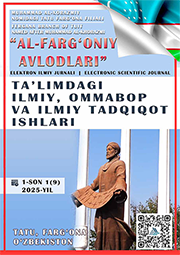MULTICLASS CLUSTERING ALGORITHM BASED ON A FULL SPACE
Keywords:
Clustering, multi-class clustering, teacherless clustering, MAXIMUS method.Abstract
With the growth of big data and the increase in data volume and diversity, the complexity of data is also increasing. Traditional clustering methods provide only a single clustering result, which limits data exploration to one possible partition. In contrast, multi-class clustering methods reveal several non-repetitive and distinct clustering solutions simultaneously or sequentially. This allows for the identification of hidden data structures. Therefore, multi-class clustering has become a popular and promising area of research today. In this study, an approach and algorithm for the problem of multiclass clustering focused on the importance of objects were developed.
References
G. Yu, L. Ren, J. Wang, C. Domeniconi, X. Zhang, Multiple clusterings: Recent advances and perspectives, Computer Science Review, Volume 52, 2024, https://doi.org/10.1016/j.cosrev.2024.100621
D. Gondek, T. Hofmann, Conditional information bottleneck clustering, in: IEEE International Conference on Data Mining, 2003, pp. 36–42.
D. Gondek, T. Hofmann, Non-redundant clustering with conditional ensembles, in: ACM SIGKDD International Conference on Knowledge Discovery in Data Mining, 2005, pp. 70–77.
E. Bae, J. Bailey, Coala: A novel approach for the extraction of an alternate clus- tering of high quality and high dissimilarity, in: IEEE International Conference on Data Mining, 2006, pp. 53–62.
J. Hu, J. Pei, Subspace multi-clustering: a review, Knowl. Inf. Syst. 56 (2) (2018) 257–284.
R. Caruana, M. Elhawary, N. Nguyen, C. Smith, Meta clustering, in: IEEE International Conference on Data Mining, 2006, pp. 107–118.
D. Gondek, T. Hofmann, Non-redundant data clustering, Knowl. Inf. Syst. 12(1) (2007) 1–24.
E. Bae, J. Bailey, G. Dong, A clustering comparison measure using density profiles and its application to the discovery of alternate clusterings, Data Min. Knowl. Discov. 21 (3) (2010) 427–471.
X.H. Dang, J. Bailey, Generation of alternative clusterings using the cami approach, in: IEEE International Conference on Data Mining, 2010, pp. 118–129.
S. Yang, L. Zhang, Non-redundant multiple clustering by nonnegative matrix factorization, Mach. Learn. 106 (2017) 695–712.
E. Muller, S. Gunnemann, I. Farber, T. Seidl, Discovering multiple clustering solutions: Grouping objects in different views of the data, in: IEEE International Conference on Data Engineering, 2012, pp. 1207–1210.
C.C. Aggarwal, C.K. Reddy, Data clustering, in: Algorithms and Applications, 2013, Citeseer.
J. Bailey, Alternative clustering analysis: A review, in: Data Clustering, Chapman and Hall/CRC, 2013, pp. 535–550.
Nishanov A., Ruzibaev O., Chedjou J. C., Kyamakya K., Abhiram, Kolli, De Silva, Djurayev G., Khasanova M. Algorithm for the selection of informative symptoms in the classification of medical data // Developments Of Artificial Intelligence Technologies In Computation And Robotics, Volume:12, 2020, p. 647-658, doi:10.1142/9789811223334_0078
Nishanov, A., Akbarova, M., Tursunov, A., Ollamberganov, F., & Rashidova, D. (2024). Clustering algorithm based on object similarity. Journal of Mathematics, Mechanics and Computer Science, 123(3), 108–120. https://doi.org/10.26577/JMMCS2024-v123-i3-4.
Additional Files
Published
How to Cite
License
Copyright (c) 2025 Fayzulla Ollamberganov, Allambergen Kalbayev , Qudiyar Yelmuratov , Muxammed Qudaynazarov

This work is licensed under a Creative Commons Attribution 4.0 International License.












